Module 9 Population Unit 3 Language in use .
文档属性
| 名称 | Module 9 Population Unit 3 Language in use . |
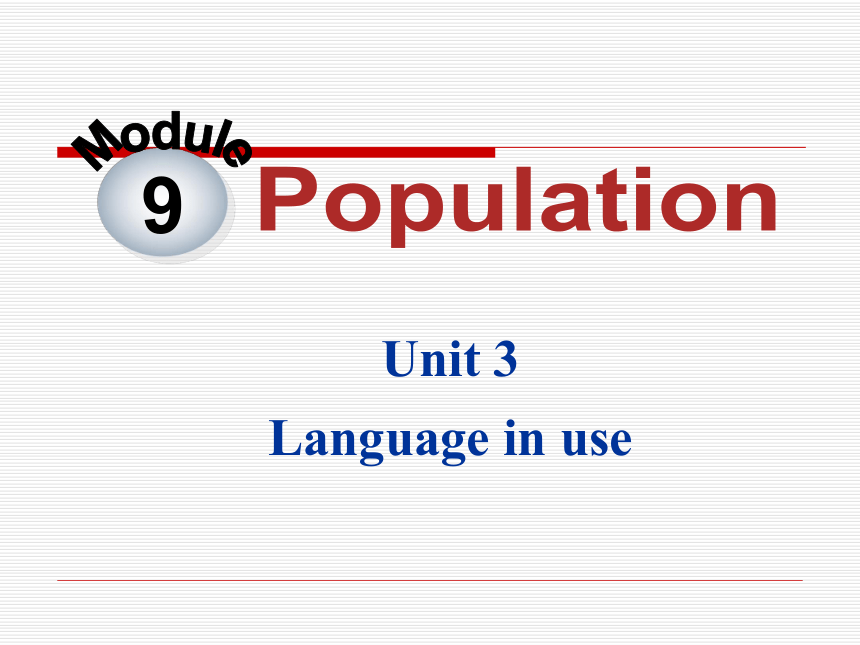
|
|
| 格式 | zip | ||
| 文件大小 | 2.1MB | ||
| 资源类型 | 教案 | ||
| 版本资源 | 外研版 | ||
| 科目 | 英语 | ||
| 更新时间 | 2014-12-24 00:00:00 | ||
图片预览

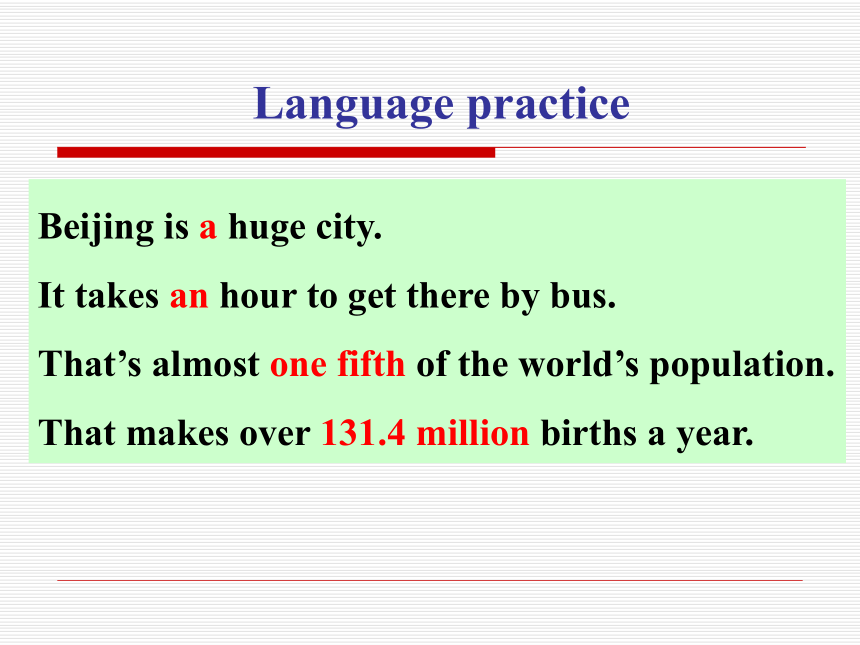
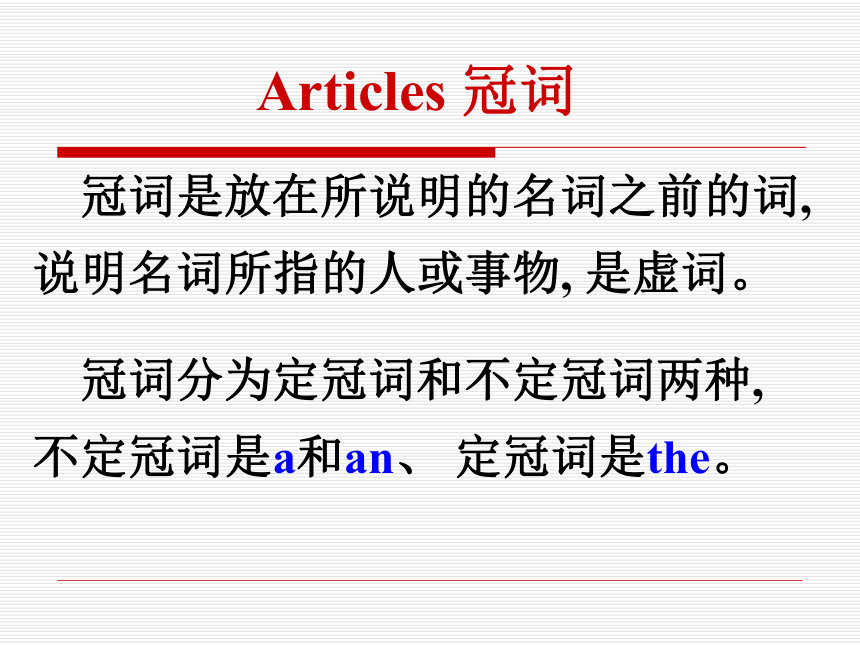
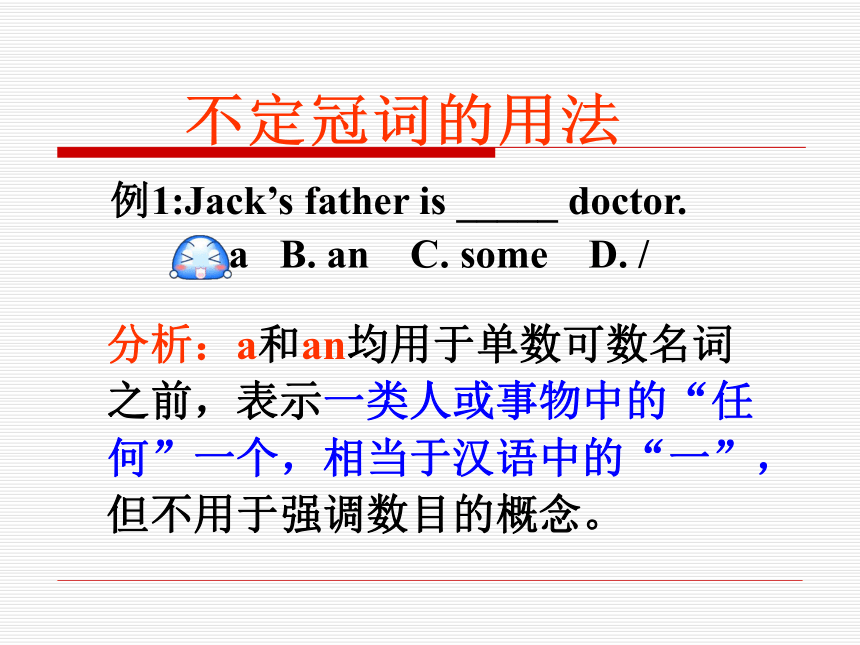
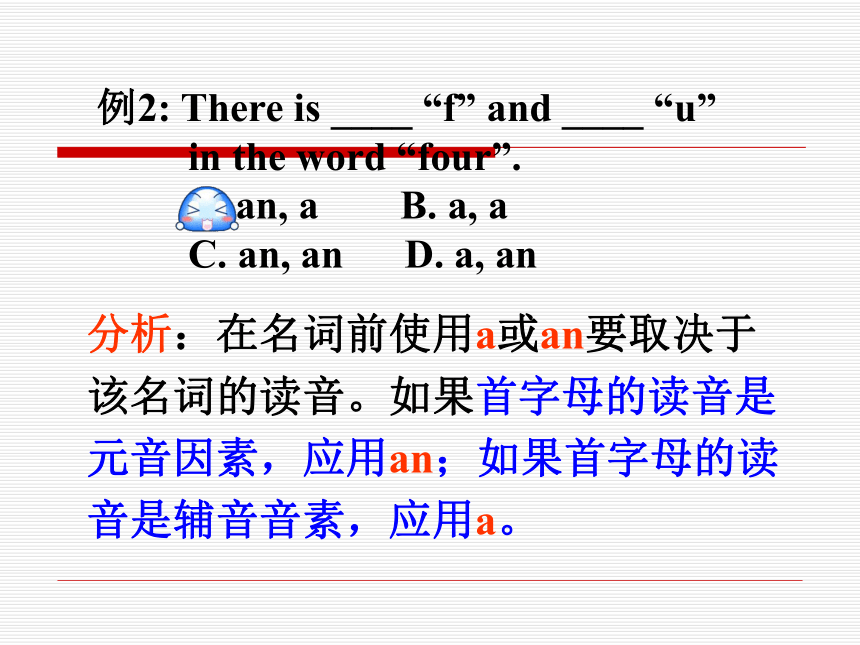
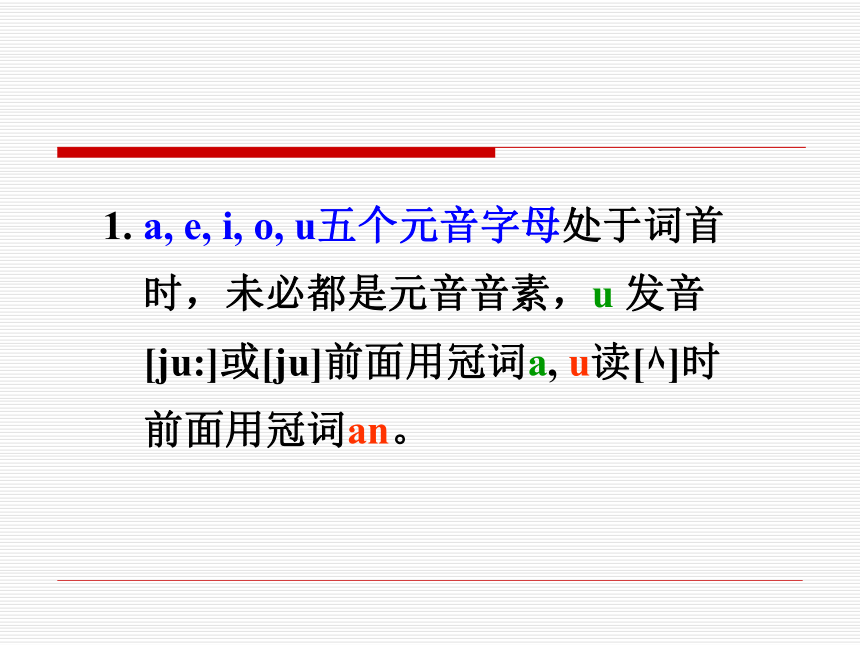
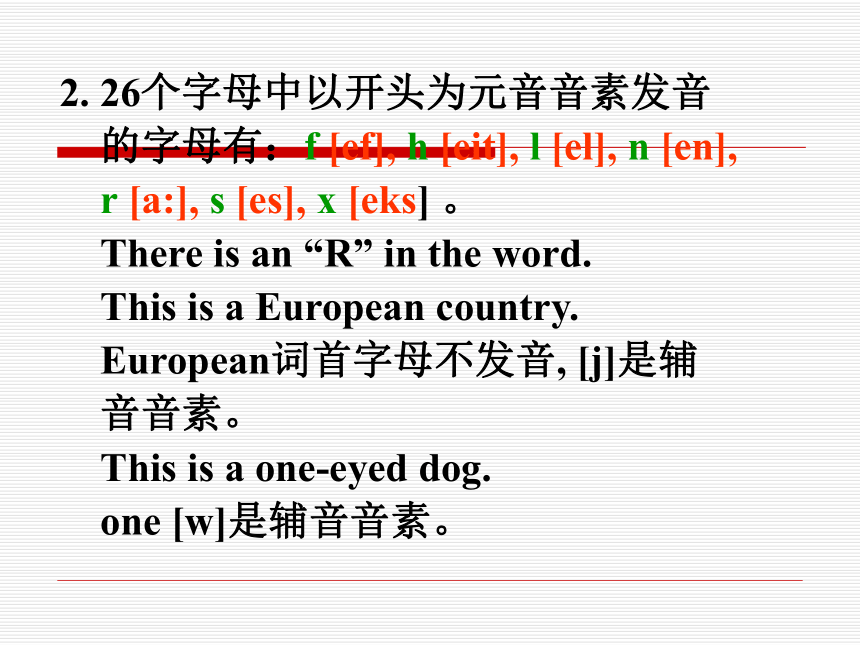
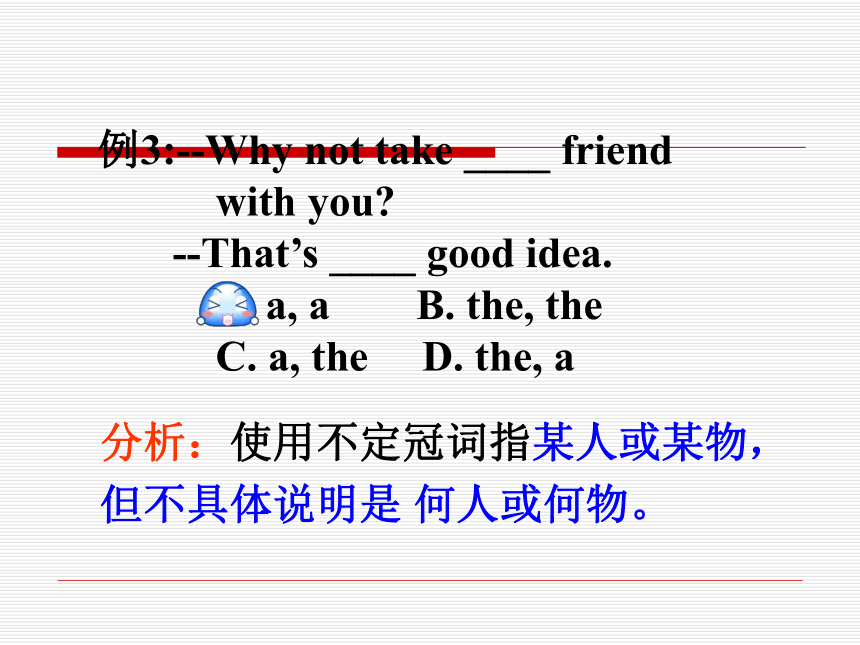

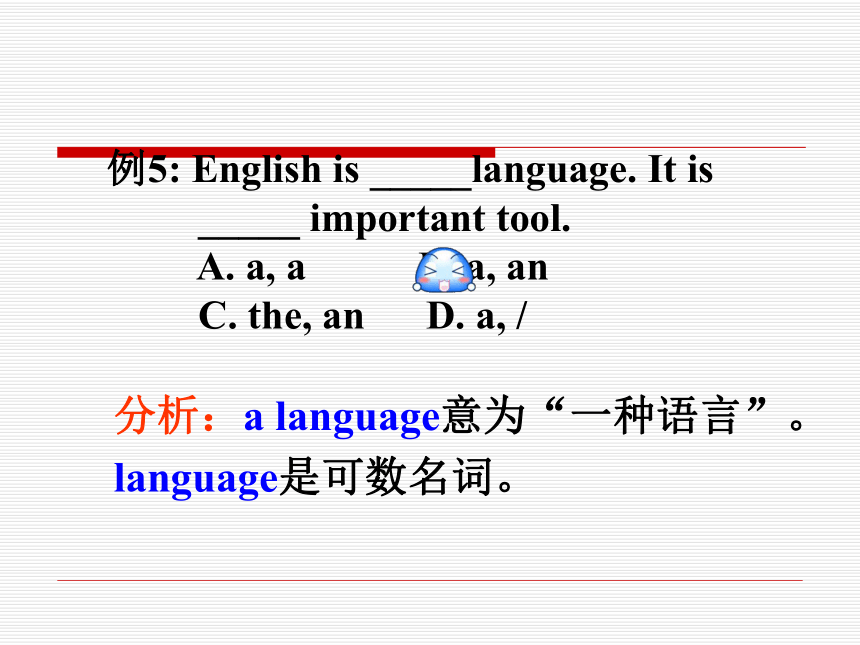
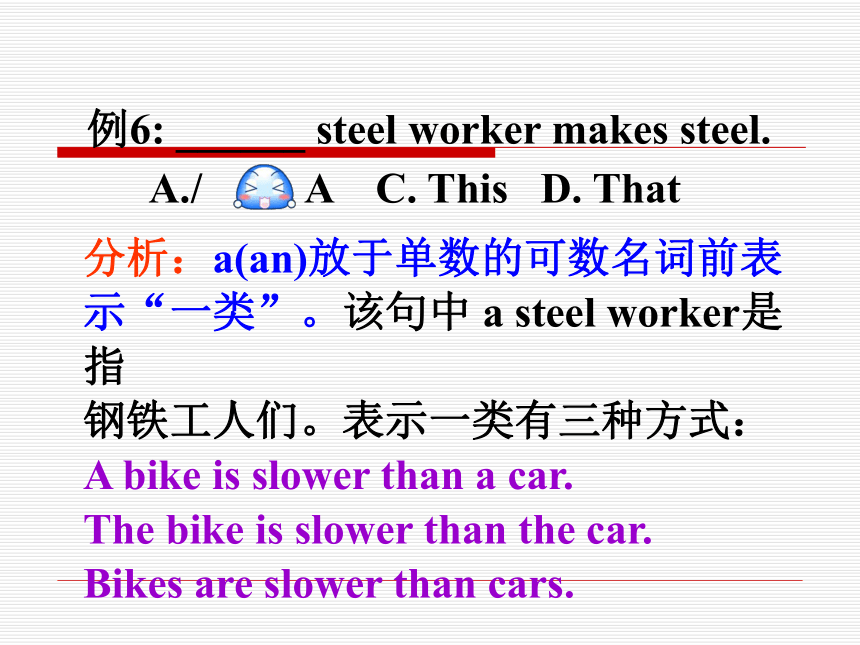
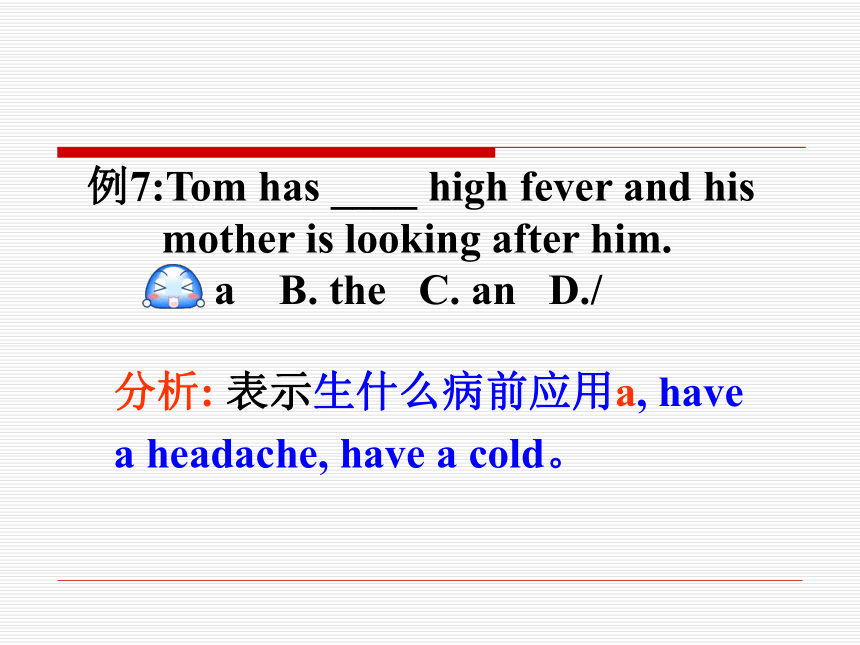
文档简介
课件76张PPT。9PopulationModuleUnit 3
Language in use
Beijing is a huge city.
It takes an hour to get there by bus.
That’s almost one fifth of the world’s population.
That makes over 131.4 million births a year.Language practiceArticles 冠词 冠词是放在所说明的名词之前的词, 说明名词所指的人或事物, 是虚词。
冠词分为定冠词和不定冠词两种, 不定冠词是a和an、 定冠词是the。分析:a和an均用于单数可数名词之前,表示一类人或事物中的“任何”一个,相当于汉语中的“一”,但不用于强调数目的概念。 不定冠词的用法 例1:Jack’s father is _____ doctor.
A. a B. an C. some D. / 例2: There is ____ “f” and ____ “u”
in the word “four”.
A. an, a B. a, a
C. an, an D. a, an分析:在名词前使用a或an要取决于该名词的读音。如果首字母的读音是元音因素,应用an;如果首字母的读音是辅音音素,应用a。1. a, e, i, o, u五个元音字母处于词首
时,未必都是元音音素,u 发音
[ju:]或[ju]前面用冠词a, u读[?]时
前面用冠词an。2. 26个字母中以开头为元音音素发音
的字母有:f [ef], h [eit], l [el], n [en],
r [a:], s [es], x [eks] 。
There is an “R” in the word.
This is a European country.
European词首字母不发音, [j]是辅
音音素。
This is a one-eyed dog.
one [w]是辅音音素。 例3:--Why not take ____ friend
with you?
--That’s ____ good idea.
A. a, a B. the, the
C. a, the D. the, a分析:使用不定冠词指某人或某物,但不具体说明是 何人或何物。例4: Take the medicine three times
____ day.
A. a B. the C. an D./分析:使用不定冠词表示单位,fifty miles an hour 意为“每小时50公里”,twice a week 意为“每周两次”。例5: English is _____language. It is
_____ important tool.
A. a, a B. a, an
C. the, an D. a, /分析:a language意为“一种语言”。language是可数名词。例6: ______ steel worker makes steel.
A./ B. A C. This D. That分析:a(an)放于单数的可数名词前表
示“一类”。该句中 a steel worker是指
钢铁工人们。表示一类有三种方式:
A bike is slower than a car.
The bike is slower than the car.
Bikes are slower than cars.例7:Tom has ____ high fever and his
mother is looking after him.
A. a B. the C. an D./分析: 表示生什么病前应用a, have a headache, have a cold。例8:Mary takes ____ walk after supper
every day.
A. the B. a C. / D. one分析: give, take, have与一些动词名
词化的词连用,表示一次动作,名
词前要加a。
have a talk (bath, look); make a living (promise); take a swim (walk, rest)
give a talk (whistle, smile)例9:The old woman had____ fire in her
room.
A. the B. / C. a D. this分析: 抽象名词和物质名词的具体化时,该名词前要加a。
It is a great joy to study at this college.
This kind of wood can make into a good paper.
He made a living by selling newspaper.例1: There is ___bridge over the river.
___ bridge is made of stone.
A. a, A B. a, The
C. the, The D. the, A 分析: 文章中第一次出现的可数名词
前用a(an)。下次再出现此名词则用the。
I have a little bird. The bird is yellow.定冠词的用法例2: ___ old workers under that tree
are from Shanghai.
A. The B. An C. This D. That分析:名词后有表示范围、地点的介词短语限定时, 名词前应加the来表示特指。
The boys here are interested in sports.例3: ____ first one sat down and the
second stood up.
A. The B. A C. One D. An分析: 序数词前表示顺序时前加the。
Mary is the third to come in.例4: Winter is ____ coldest season of the
year.
A. a B. the C./ D. so分析: 形容词最高级前及Only修饰的名词前均要加 the。
Mary is the only girl who is often late for class.例5: ___ moon moves around ___ earth,
and they both are smaller than
____ sun.
A. The, the, the B. A, an, a
C. The, an, the D. The, the, a分析: 定冠词用于表示世界上独一无二的物体名词前。例6: We live in ____ south of China.
A. the B./ C. a D. some 分析: 表示东、南、西、北方的名词前要加the。
The sun rises in the east.例7: ____ browns are watching TV at
home at the moment.
A. / B. The C. Mr. D. A分析: the放于姓氏的复数形式前时,表示一家人或一姓的夫妇二人。例8: He will go to see you off at ___
Railway Station.
A. a B. an C. the D. /分析: the+普通名词构成专有名词。
the United States/the United Nations
the People’s Republic of China例9: I was playing ____ piano at eight
yesterday morning.
A. a B. / C. the D. this分析: play+乐器表示弹奏时,该乐器名
词前加 the。
Alice likes to play the violin while Kate
likes to play the flute.
表示数量时可用a。
This is a new piano against the wall.例10:Our teacher gets up early in ____
morning.
A. the B. / C. a D. an分析: 牢记一些含the的习惯用语,在句中用作时间状语。
in the afternoon (evening)/
in the daytime
at the beginning/in the end例11:There is a large ship in ____middle
of the river.
A. a B. / C. the D. any分析: 牢记一些含the的习惯用语,在句中用作地点状语。
on the right (left) /in the front of
in the middle of the meeting /
the forest / at the foot of the hill例12:Last night we went to ____
cinema.
A. the B. a C. / D. those分析: 牢记一些固定搭配:
go to the concert (theatre)例13: ____ young should care for and
help ____ old.
A. The, a B. The, the
C. A, the D. An, an分析: the+形容词(形容词名词化)
表示一类人或事物。
the poor / the rich / the sick /
the beautiful例14: The small town lies on ____
Yangtzi River.
A. a B. an C. / D. the分析: 定冠词the用在江河、海洋、 山脉、湖泊、群岛名称的前面。
the Dead Sea / the Black Sea
the North China Plain 华北平原例1:Paper is made of ____ bamboo.
A. a B. the C. / D. that分析: 物质名词和抽象名词前一般不加冠词。
Wood can be made into chairs and tables.
Iron is a kind of metal.零冠词的用法 例2: ____ January is the first month
of the year.
A. The B. A C. / D. That分析: 表示节日、月份的名词前一般
不加the。Spring is coming.
He was born in December.
如果表示有某年限定的季节和月份时,季节和月份前要加the。
He was born in the Summer of 1964.例3: We have no classes ____ on Sundays.
A. the B. these C. / D. those分析: 表示一周中七日的名称前一般不加冠词。例4: I studies ___English in___ England.
A. /, / B. an, the
C. an, an D. /, the分析: 学科前和国名、洲名前一般不加
冠词。
learn Chinese (maths, physics, chemistry)
China is in Asia.
in Germany (Japan)
in Africa (Europe …)例5: They often take a walk in ____
Hyde Park.
A. the B. a C. / D. this分析: 在一些专有名词(地名、节假日)之前不加冠词。
Christmas Day New year’s Eve
National Day Children’s Day
Teachers’ Day Wall Street例6:The thief was thrown into ___ prison.
A. the B. a C. this D. /分析: 表示某一概念,而不是某具体工作的部门时,名词前不加冠词。例7: He doesn’t have ____ breakfast at
home.
A. a B. the C. this D. /分析: 表示三餐的名词前不加冠词,如果前面有形容词修饰该词,表示
“一顿……的饭”,可加a。
have a big supper (nice lunch)例8:We go to work by __ bus.
A. / B. a C. the D. one分析: 表示交通工具的手段时,用by+名词表示,该名词前不用冠词。by bike (taxi, car, train, plane, spaceship)或by sea (water, air, land)
如果用介词in或on,名词前要加冠词或物主代词。例9: ____ running is good.
A. The B. A C. / D. An 分析: 动名词前一般不用冠词。
Walking on the moon is difficult.
Seeing is believing.例10:These boys play ____ football
after class.
A. a B. the C. that D. /分析: 球类、棋类、游戏名称前不加冠词。例11:The students of ____ Grade One are
having a meeting.
A. these B. / C. a D. an分析: 名词+数词表示顺序时,前面不加冠词the;序数词+名词表示顺序数,序数词前加冠词the。
turn to page 3 / the third page
Lesson One / the first lesson
gate Five / the fifth Gate例12:There is no ____ book on the
desk.
A. the B. a C. an D. /分析: 名词前有物主代词、指示代词、不定代词、名词所有格或any和no时,均不再用冠词。如:
no books, not a book, not any books例13:He often works late at ____ night.
A. / B. the C. a D. all分析: 表示时间或地点的一些介词+名词的词组和一些固定词组中,均不加冠词。
at home, in town, at noon, at daybreak, in trouble, in danger, in fact等。注意:
有些名词前用冠词或不用冠词,其意义有所不同。如:
1) at table 在吃饭
at the table 在桌子旁
2) in class 在上课
in the class 在班级中3) go to school 去上学
go to the school 到那所学校去
4) go to bed 上床睡觉
go to the bed 到床那边去
5) in front of 在…的前面
in the front of 在…的前部1. 不定冠词 a / an的用法:
a 用以辅音音素开头的单词前,an 用以元音音素开头的单词前。 例如: a book, a table,
an elephant, an orange
2) 表示数量“一”,意思与“one”接近,但数的概念没有one强。例如:
The little girl played a whole day outside.
这个小女孩在外面玩了一整天。
3) 用于首次提到的某人或某物前,表泛指。
A teacher from England will teach us English.
一位来自英格兰的教师将教我们英语。 4) 用于可数名词的单数前,表示一类人或物。 A tiger is very dangerous. 老虎很危险。
5) 表示某类人或事物当中的任何一个,相当于one。泛指人或事物的类别。例如:
He is a ball player. 他是一位棒球手。
6) 表示“每一个”,相当于every。用在表示时间,速度,价格的名词前。
You should take this medicine three times a day.
你应该每天服三次药。
7) 表示 “某一” 。
A Mr. Wang is waiting for you.
一位姓王的先生在等你。1. 文章中第一次出现的可数名词前
用a /an。下次再出现此名词时。
2. 名词后有表示范围、地点的介词
短语限定时。
3. 序数词前表示顺序时。
4. 形容词最高级前及only修饰的名词
前。
5. 定冠词用于表示世界上独一无二的
物体名词前。定冠词的用法6. 表示东、南、西、北方的名词前
7. 姓氏的复数形式前时,表示一家人
或一姓的夫妇二人。
8. the+普通名词构成专有名词。
9. play+乐器表示弹奏时,该乐器名
词前加 the。
10. the+形容词(形容词名词化)
表示一类人或事物。
11. 定冠词the用在江河、海洋、山脉、
湖泊、群岛名称的前面。1. 物质名词和抽象名词前一般不加冠词。
2. 表示节日、月份的名词前一般不加the。
3. 表示一周中七日的名称前一般不加冠词。
4. 学科前和国名、洲名前一般不加冠词。
5. 在一些专有名词(地名、节假日)
之前不加冠词。
6. 表示某一概念,而不是某具体工作的
部门时,名词前不加冠词。
7. 表示三餐的名词前不加冠词。零冠词的用法8. 表示交通工具的手段时,用by+名词表
示,该名词前不用冠词。
9. 动名词前一般不用冠词。
10. 球类、棋类、游戏名称前不加冠词。
11.名词前有物主代词、指示代词、不定代
词、名词所有格或any和 no时,均不再
用冠词。
12.表示时间或地点的一些介词+名词的词
组和一些固定词组中,均不加冠词。
13.家庭成员的称呼、称呼语或只一人担任
的职务名词前不用冠词。2. 定冠词 the 的用法:
定冠词是指特定的人或物,用于特指的名词前。
例如:
The book is mine. 这本书是我的 。
2) 表示上文提到的或说话双方都知道的人或物。
例如:
I heard a report. The report was about war.
我听了一个报告,这个报告是关于战争的。
Please close the window before you fall asleep.
请在睡觉之前关上窗子。 3) 用于序数词、形容词最高级以及对两者进行比较时起特定作用的比较级前。例如:
Our classroom is on the second floor.
It’s the most interesting book I have read.
I have two sisters. The elder one is a doctor.
4) 世界上独一无二的事物前常用the。例如:
The moon goes round the earth.
5) 在姓的复数形式前加the,表示一家人或夫妇二人。例如:
the Greens 格林一家人或格林夫妇。
6) 用于某些形容词前表示一类人或事物。 the rich, the poor, the old 7) 用于江河、山脉、湖泊、岛屿、杂志和报纸等专有名词前。例如:
the Changjiang River, the Great Wall,
the Summer Palace
8) 用于由普通名词构成的专有名词前。例如:
the United States
9) 用于乐器名称前。例如:
play the piano / violin
10) 用于固定短语中。例如:
at the moment, by the way, in the middle of3. 零冠词的用法
一般来说,在一个句子中有时不加冠词,如 We go to school by bus.
这种不加冠词的现象,就叫“零冠词”。
复数可数名词前,表示人或物的类别,或泛指不定
量的人或物。例如:
Horses are useful animals.
There are pens and books on the desk.2) 当名词前有物主代词、指示代词、不定代词及名词所有格等修饰时。例如:
She is our math teacher. The man in blue is Mary’s father. No one can get this book.
3) 交通工具、学科名词前。
by boat, on foot I like English.
4) 球类运动、棋类游戏及语言名称前。 He prefers to play football. The two old men are playing chess. Can you speak English? 5) 季节、月份、星期、节日、一日三餐等名词前。例如:
in spring, on Monday Children’s Day is coming. I ate some noodles for lunch.
6) 某些固定搭配的词组。
in public; go to bedMina is (1) ____ eighteen-year-old girl. She’s got (2) ____ brother and (3) ____ sister. Mina is (4) ____ oldest child in (5) _____ family. She lives in (6) ____ very big city. She has (7) ___ job in (8) ____ hotel. She hopes that one day she will have (9) ___ chance to go to (10) ___ college.antheaatheaaaaComplete the passage with a, an or the where necessary.
英语分数的表示法:
用“基数词+序数词”表示,其中基数词表示分子,序数词表示分母。分子除用one外,也可用a;如果分子大于1,分母要用复数形式。
Two thirds of the students have passed the exam.?三分之二的学生考试及格了。注意:1/2不能说a(one)second,而要说a(one)half。
1/4和3/4可以说a(one)fourth和three fourths,但常用a quarter和three quarters表示。
若它们在句子中作主语,则谓语动词是用单数还是复数取决于名词,即与分数所修饰的名词保持一致。
About two thirds of the students attend the meeting.
大约2/3的学生都参加了会议。 在英语中,对于万以上的数字,我们改如何表达呢?这就要记住英语数字读法特点。以下面一个数字为例:6,500,431,729hundredthousandmillionbillion注意每三个数为一个单位,按照百、
十、个向下读。大数字的表达方法5 Complete the sentences with the correct
form of the words in the box. few good much small1 We believe the schools in Arnwick are very
good, and we are working to make them
even_______ .
2 Their flat is too large for two people. They
want to find a _______one.
3 Anna always talks about her ideas. I think she
needs to listen _______.
4 There are a lot of parks in this city. I think
there are _______parks in a lot of other cities.bettersmallermorefewer7 Complete the passage with the words in the box. countryside pollution population
space trafficOur world is facing many problems. Two of the biggest are increasing population and pollution.
The (1) _____________of the world is increasing quickly. Why is this happening? Because more babies are born every year and populationpeople also live longer. Many people are leaving the(2) _________ to work in the cities, but there is not enough (3) __________for
so many people.
Another huge problem for the world is
(4)__________. There is so much (5) ________
on the roads that in some cities the air is heavily polluted. We must work harder to protect our world.countrysidespacepollutiontrafficall over the world closed down in the future
it takes not… any more 8 Complete the sentences with the expressions
in the box.1 Growing population is a problem___________
_____________.
2 The population of China may grow more
slowly .
3 The supermarket when a
bigger one opened in the town.
all overthe worldin the futureclosed down4 Usually an hour to get there by bus.
5 The town had a lot of population in the past
but it is a problem .it takesnot any morePopulation increase is a big problem in many countries. That will cause a lot of problems, such as too many people, too much pollution as well as too much traffic and noise. In order to solve these problems, the government should build more flats and they should make efforts to protect the city against pollution. People also need better public services.1.为…准备笔记
2.我们日益增长的人口
3.在正确的地方
4.谈论
4.一座大城市
5.大量的人口
6.引起很多问题
7.例如
8.太多的交通
9.不仅
10.人口增长
prepare some notes for… in the right place talk about a huge city cause a lot of problems a large population such as too much traffic our growing population not only population increase11.一个大问题
12.出生
13.我不相信
14.…的人口
15.五分之一
16.世界人口
17.也就是说
18.稍等(一分钟)
19.写下
20.在将来
21. (人口)变得越来越少 a big problem be born I can’t believe it. one fifth Hang on a minute. write down in the future get smaller the population ofthe world’s populationthat is1.一座安静的村庄
2.离…近
3.搬到某地
4.找工作
5.需要做某事
6.需要居住的地方
7.住在市中心
8.建造公寓
9.成为…的部分
10.当地学校
a quiet village
be close to
move to
find jobs
need to do sth
need places to live
live in the city centre
build flats
become part of
the local school
11.关闭
12.到那里
13.很清楚
14.新鲜空气
15.更好的公共设施
16.做所有这些事情
17.帮忙做某事
18.解决所有这些问题
19.事实上
20.全世界
21.与…一样
22.作更多地努力来做某事
23.正如我们所说
close down
get there
It is clear that
fresh air
better public services
do all these things
help (to) do sth
solve all these problems
in fact
all over the world
the same …as
make more efforts to do sth
as we sayPractice Write the words with a, an, no article (/) or in plural form.1.There’s no air or water on ____ moon.
2. ___ Yellow River is ___ second longest
river in ___ China.
3. My mother bought me ___ very nice
bike. I like ____ bike very much. the The the a the /4. Xiao Ming likes playing ____ basketball, but he doesn’t like playing _____ piano.
5. The students don’t have classes in ___
afternoon on ____ Saturday.
6. I often watch TV in ____ evening.
7. Let’s go out for ____ walk.
8. What would you like for lunch, __
coffee or ____ milk? the / the a / / the /
9. You dropped ____“u” and ____“s” in this word.
10. There is ____ pen on the desk. _____ pen is mine.
11. I like playing _____ basketball, but I don’t like playing _____ piano.anaThea×the12. He drove the car at the speed of eighty kilometers _____ hour.
13. I think English is _____ useful subject. Do you think so?
14. He had _____apple and _____ glass of milk for ______ supper.anaana×15. —Who is _____ boy?
—He is my ____ best friend.
16. Does Bob come from _____USA or _____ Australia?
17. Linda works in _____ hospital. Her sister works in ______ same hospital.
18. How do you go to work, by _____bus or on _____foot?××thethe×athe×Homework Make a graph and share with your classmates.
Recite all the words and phrases of this unit.
Language in use
Beijing is a huge city.
It takes an hour to get there by bus.
That’s almost one fifth of the world’s population.
That makes over 131.4 million births a year.Language practiceArticles 冠词 冠词是放在所说明的名词之前的词, 说明名词所指的人或事物, 是虚词。
冠词分为定冠词和不定冠词两种, 不定冠词是a和an、 定冠词是the。分析:a和an均用于单数可数名词之前,表示一类人或事物中的“任何”一个,相当于汉语中的“一”,但不用于强调数目的概念。 不定冠词的用法 例1:Jack’s father is _____ doctor.
A. a B. an C. some D. / 例2: There is ____ “f” and ____ “u”
in the word “four”.
A. an, a B. a, a
C. an, an D. a, an分析:在名词前使用a或an要取决于该名词的读音。如果首字母的读音是元音因素,应用an;如果首字母的读音是辅音音素,应用a。1. a, e, i, o, u五个元音字母处于词首
时,未必都是元音音素,u 发音
[ju:]或[ju]前面用冠词a, u读[?]时
前面用冠词an。2. 26个字母中以开头为元音音素发音
的字母有:f [ef], h [eit], l [el], n [en],
r [a:], s [es], x [eks] 。
There is an “R” in the word.
This is a European country.
European词首字母不发音, [j]是辅
音音素。
This is a one-eyed dog.
one [w]是辅音音素。 例3:--Why not take ____ friend
with you?
--That’s ____ good idea.
A. a, a B. the, the
C. a, the D. the, a分析:使用不定冠词指某人或某物,但不具体说明是 何人或何物。例4: Take the medicine three times
____ day.
A. a B. the C. an D./分析:使用不定冠词表示单位,fifty miles an hour 意为“每小时50公里”,twice a week 意为“每周两次”。例5: English is _____language. It is
_____ important tool.
A. a, a B. a, an
C. the, an D. a, /分析:a language意为“一种语言”。language是可数名词。例6: ______ steel worker makes steel.
A./ B. A C. This D. That分析:a(an)放于单数的可数名词前表
示“一类”。该句中 a steel worker是指
钢铁工人们。表示一类有三种方式:
A bike is slower than a car.
The bike is slower than the car.
Bikes are slower than cars.例7:Tom has ____ high fever and his
mother is looking after him.
A. a B. the C. an D./分析: 表示生什么病前应用a, have a headache, have a cold。例8:Mary takes ____ walk after supper
every day.
A. the B. a C. / D. one分析: give, take, have与一些动词名
词化的词连用,表示一次动作,名
词前要加a。
have a talk (bath, look); make a living (promise); take a swim (walk, rest)
give a talk (whistle, smile)例9:The old woman had____ fire in her
room.
A. the B. / C. a D. this分析: 抽象名词和物质名词的具体化时,该名词前要加a。
It is a great joy to study at this college.
This kind of wood can make into a good paper.
He made a living by selling newspaper.例1: There is ___bridge over the river.
___ bridge is made of stone.
A. a, A B. a, The
C. the, The D. the, A 分析: 文章中第一次出现的可数名词
前用a(an)。下次再出现此名词则用the。
I have a little bird. The bird is yellow.定冠词的用法例2: ___ old workers under that tree
are from Shanghai.
A. The B. An C. This D. That分析:名词后有表示范围、地点的介词短语限定时, 名词前应加the来表示特指。
The boys here are interested in sports.例3: ____ first one sat down and the
second stood up.
A. The B. A C. One D. An分析: 序数词前表示顺序时前加the。
Mary is the third to come in.例4: Winter is ____ coldest season of the
year.
A. a B. the C./ D. so分析: 形容词最高级前及Only修饰的名词前均要加 the。
Mary is the only girl who is often late for class.例5: ___ moon moves around ___ earth,
and they both are smaller than
____ sun.
A. The, the, the B. A, an, a
C. The, an, the D. The, the, a分析: 定冠词用于表示世界上独一无二的物体名词前。例6: We live in ____ south of China.
A. the B./ C. a D. some 分析: 表示东、南、西、北方的名词前要加the。
The sun rises in the east.例7: ____ browns are watching TV at
home at the moment.
A. / B. The C. Mr. D. A分析: the放于姓氏的复数形式前时,表示一家人或一姓的夫妇二人。例8: He will go to see you off at ___
Railway Station.
A. a B. an C. the D. /分析: the+普通名词构成专有名词。
the United States/the United Nations
the People’s Republic of China例9: I was playing ____ piano at eight
yesterday morning.
A. a B. / C. the D. this分析: play+乐器表示弹奏时,该乐器名
词前加 the。
Alice likes to play the violin while Kate
likes to play the flute.
表示数量时可用a。
This is a new piano against the wall.例10:Our teacher gets up early in ____
morning.
A. the B. / C. a D. an分析: 牢记一些含the的习惯用语,在句中用作时间状语。
in the afternoon (evening)/
in the daytime
at the beginning/in the end例11:There is a large ship in ____middle
of the river.
A. a B. / C. the D. any分析: 牢记一些含the的习惯用语,在句中用作地点状语。
on the right (left) /in the front of
in the middle of the meeting /
the forest / at the foot of the hill例12:Last night we went to ____
cinema.
A. the B. a C. / D. those分析: 牢记一些固定搭配:
go to the concert (theatre)例13: ____ young should care for and
help ____ old.
A. The, a B. The, the
C. A, the D. An, an分析: the+形容词(形容词名词化)
表示一类人或事物。
the poor / the rich / the sick /
the beautiful例14: The small town lies on ____
Yangtzi River.
A. a B. an C. / D. the分析: 定冠词the用在江河、海洋、 山脉、湖泊、群岛名称的前面。
the Dead Sea / the Black Sea
the North China Plain 华北平原例1:Paper is made of ____ bamboo.
A. a B. the C. / D. that分析: 物质名词和抽象名词前一般不加冠词。
Wood can be made into chairs and tables.
Iron is a kind of metal.零冠词的用法 例2: ____ January is the first month
of the year.
A. The B. A C. / D. That分析: 表示节日、月份的名词前一般
不加the。Spring is coming.
He was born in December.
如果表示有某年限定的季节和月份时,季节和月份前要加the。
He was born in the Summer of 1964.例3: We have no classes ____ on Sundays.
A. the B. these C. / D. those分析: 表示一周中七日的名称前一般不加冠词。例4: I studies ___English in___ England.
A. /, / B. an, the
C. an, an D. /, the分析: 学科前和国名、洲名前一般不加
冠词。
learn Chinese (maths, physics, chemistry)
China is in Asia.
in Germany (Japan)
in Africa (Europe …)例5: They often take a walk in ____
Hyde Park.
A. the B. a C. / D. this分析: 在一些专有名词(地名、节假日)之前不加冠词。
Christmas Day New year’s Eve
National Day Children’s Day
Teachers’ Day Wall Street例6:The thief was thrown into ___ prison.
A. the B. a C. this D. /分析: 表示某一概念,而不是某具体工作的部门时,名词前不加冠词。例7: He doesn’t have ____ breakfast at
home.
A. a B. the C. this D. /分析: 表示三餐的名词前不加冠词,如果前面有形容词修饰该词,表示
“一顿……的饭”,可加a。
have a big supper (nice lunch)例8:We go to work by __ bus.
A. / B. a C. the D. one分析: 表示交通工具的手段时,用by+名词表示,该名词前不用冠词。by bike (taxi, car, train, plane, spaceship)或by sea (water, air, land)
如果用介词in或on,名词前要加冠词或物主代词。例9: ____ running is good.
A. The B. A C. / D. An 分析: 动名词前一般不用冠词。
Walking on the moon is difficult.
Seeing is believing.例10:These boys play ____ football
after class.
A. a B. the C. that D. /分析: 球类、棋类、游戏名称前不加冠词。例11:The students of ____ Grade One are
having a meeting.
A. these B. / C. a D. an分析: 名词+数词表示顺序时,前面不加冠词the;序数词+名词表示顺序数,序数词前加冠词the。
turn to page 3 / the third page
Lesson One / the first lesson
gate Five / the fifth Gate例12:There is no ____ book on the
desk.
A. the B. a C. an D. /分析: 名词前有物主代词、指示代词、不定代词、名词所有格或any和no时,均不再用冠词。如:
no books, not a book, not any books例13:He often works late at ____ night.
A. / B. the C. a D. all分析: 表示时间或地点的一些介词+名词的词组和一些固定词组中,均不加冠词。
at home, in town, at noon, at daybreak, in trouble, in danger, in fact等。注意:
有些名词前用冠词或不用冠词,其意义有所不同。如:
1) at table 在吃饭
at the table 在桌子旁
2) in class 在上课
in the class 在班级中3) go to school 去上学
go to the school 到那所学校去
4) go to bed 上床睡觉
go to the bed 到床那边去
5) in front of 在…的前面
in the front of 在…的前部1. 不定冠词 a / an的用法:
a 用以辅音音素开头的单词前,an 用以元音音素开头的单词前。 例如: a book, a table,
an elephant, an orange
2) 表示数量“一”,意思与“one”接近,但数的概念没有one强。例如:
The little girl played a whole day outside.
这个小女孩在外面玩了一整天。
3) 用于首次提到的某人或某物前,表泛指。
A teacher from England will teach us English.
一位来自英格兰的教师将教我们英语。 4) 用于可数名词的单数前,表示一类人或物。 A tiger is very dangerous. 老虎很危险。
5) 表示某类人或事物当中的任何一个,相当于one。泛指人或事物的类别。例如:
He is a ball player. 他是一位棒球手。
6) 表示“每一个”,相当于every。用在表示时间,速度,价格的名词前。
You should take this medicine three times a day.
你应该每天服三次药。
7) 表示 “某一” 。
A Mr. Wang is waiting for you.
一位姓王的先生在等你。1. 文章中第一次出现的可数名词前
用a /an。下次再出现此名词时。
2. 名词后有表示范围、地点的介词
短语限定时。
3. 序数词前表示顺序时。
4. 形容词最高级前及only修饰的名词
前。
5. 定冠词用于表示世界上独一无二的
物体名词前。定冠词的用法6. 表示东、南、西、北方的名词前
7. 姓氏的复数形式前时,表示一家人
或一姓的夫妇二人。
8. the+普通名词构成专有名词。
9. play+乐器表示弹奏时,该乐器名
词前加 the。
10. the+形容词(形容词名词化)
表示一类人或事物。
11. 定冠词the用在江河、海洋、山脉、
湖泊、群岛名称的前面。1. 物质名词和抽象名词前一般不加冠词。
2. 表示节日、月份的名词前一般不加the。
3. 表示一周中七日的名称前一般不加冠词。
4. 学科前和国名、洲名前一般不加冠词。
5. 在一些专有名词(地名、节假日)
之前不加冠词。
6. 表示某一概念,而不是某具体工作的
部门时,名词前不加冠词。
7. 表示三餐的名词前不加冠词。零冠词的用法8. 表示交通工具的手段时,用by+名词表
示,该名词前不用冠词。
9. 动名词前一般不用冠词。
10. 球类、棋类、游戏名称前不加冠词。
11.名词前有物主代词、指示代词、不定代
词、名词所有格或any和 no时,均不再
用冠词。
12.表示时间或地点的一些介词+名词的词
组和一些固定词组中,均不加冠词。
13.家庭成员的称呼、称呼语或只一人担任
的职务名词前不用冠词。2. 定冠词 the 的用法:
定冠词是指特定的人或物,用于特指的名词前。
例如:
The book is mine. 这本书是我的 。
2) 表示上文提到的或说话双方都知道的人或物。
例如:
I heard a report. The report was about war.
我听了一个报告,这个报告是关于战争的。
Please close the window before you fall asleep.
请在睡觉之前关上窗子。 3) 用于序数词、形容词最高级以及对两者进行比较时起特定作用的比较级前。例如:
Our classroom is on the second floor.
It’s the most interesting book I have read.
I have two sisters. The elder one is a doctor.
4) 世界上独一无二的事物前常用the。例如:
The moon goes round the earth.
5) 在姓的复数形式前加the,表示一家人或夫妇二人。例如:
the Greens 格林一家人或格林夫妇。
6) 用于某些形容词前表示一类人或事物。 the rich, the poor, the old 7) 用于江河、山脉、湖泊、岛屿、杂志和报纸等专有名词前。例如:
the Changjiang River, the Great Wall,
the Summer Palace
8) 用于由普通名词构成的专有名词前。例如:
the United States
9) 用于乐器名称前。例如:
play the piano / violin
10) 用于固定短语中。例如:
at the moment, by the way, in the middle of3. 零冠词的用法
一般来说,在一个句子中有时不加冠词,如 We go to school by bus.
这种不加冠词的现象,就叫“零冠词”。
复数可数名词前,表示人或物的类别,或泛指不定
量的人或物。例如:
Horses are useful animals.
There are pens and books on the desk.2) 当名词前有物主代词、指示代词、不定代词及名词所有格等修饰时。例如:
She is our math teacher. The man in blue is Mary’s father. No one can get this book.
3) 交通工具、学科名词前。
by boat, on foot I like English.
4) 球类运动、棋类游戏及语言名称前。 He prefers to play football. The two old men are playing chess. Can you speak English? 5) 季节、月份、星期、节日、一日三餐等名词前。例如:
in spring, on Monday Children’s Day is coming. I ate some noodles for lunch.
6) 某些固定搭配的词组。
in public; go to bedMina is (1) ____ eighteen-year-old girl. She’s got (2) ____ brother and (3) ____ sister. Mina is (4) ____ oldest child in (5) _____ family. She lives in (6) ____ very big city. She has (7) ___ job in (8) ____ hotel. She hopes that one day she will have (9) ___ chance to go to (10) ___ college.antheaatheaaaaComplete the passage with a, an or the where necessary.
英语分数的表示法:
用“基数词+序数词”表示,其中基数词表示分子,序数词表示分母。分子除用one外,也可用a;如果分子大于1,分母要用复数形式。
Two thirds of the students have passed the exam.?三分之二的学生考试及格了。注意:1/2不能说a(one)second,而要说a(one)half。
1/4和3/4可以说a(one)fourth和three fourths,但常用a quarter和three quarters表示。
若它们在句子中作主语,则谓语动词是用单数还是复数取决于名词,即与分数所修饰的名词保持一致。
About two thirds of the students attend the meeting.
大约2/3的学生都参加了会议。 在英语中,对于万以上的数字,我们改如何表达呢?这就要记住英语数字读法特点。以下面一个数字为例:6,500,431,729hundredthousandmillionbillion注意每三个数为一个单位,按照百、
十、个向下读。大数字的表达方法5 Complete the sentences with the correct
form of the words in the box. few good much small1 We believe the schools in Arnwick are very
good, and we are working to make them
even_______ .
2 Their flat is too large for two people. They
want to find a _______one.
3 Anna always talks about her ideas. I think she
needs to listen _______.
4 There are a lot of parks in this city. I think
there are _______parks in a lot of other cities.bettersmallermorefewer7 Complete the passage with the words in the box. countryside pollution population
space trafficOur world is facing many problems. Two of the biggest are increasing population and pollution.
The (1) _____________of the world is increasing quickly. Why is this happening? Because more babies are born every year and populationpeople also live longer. Many people are leaving the(2) _________ to work in the cities, but there is not enough (3) __________for
so many people.
Another huge problem for the world is
(4)__________. There is so much (5) ________
on the roads that in some cities the air is heavily polluted. We must work harder to protect our world.countrysidespacepollutiontrafficall over the world closed down in the future
it takes not… any more 8 Complete the sentences with the expressions
in the box.1 Growing population is a problem___________
_____________.
2 The population of China may grow more
slowly .
3 The supermarket when a
bigger one opened in the town.
all overthe worldin the futureclosed down4 Usually an hour to get there by bus.
5 The town had a lot of population in the past
but it is a problem .it takesnot any morePopulation increase is a big problem in many countries. That will cause a lot of problems, such as too many people, too much pollution as well as too much traffic and noise. In order to solve these problems, the government should build more flats and they should make efforts to protect the city against pollution. People also need better public services.1.为…准备笔记
2.我们日益增长的人口
3.在正确的地方
4.谈论
4.一座大城市
5.大量的人口
6.引起很多问题
7.例如
8.太多的交通
9.不仅
10.人口增长
prepare some notes for… in the right place talk about a huge city cause a lot of problems a large population such as too much traffic our growing population not only population increase11.一个大问题
12.出生
13.我不相信
14.…的人口
15.五分之一
16.世界人口
17.也就是说
18.稍等(一分钟)
19.写下
20.在将来
21. (人口)变得越来越少 a big problem be born I can’t believe it. one fifth Hang on a minute. write down in the future get smaller the population ofthe world’s populationthat is1.一座安静的村庄
2.离…近
3.搬到某地
4.找工作
5.需要做某事
6.需要居住的地方
7.住在市中心
8.建造公寓
9.成为…的部分
10.当地学校
a quiet village
be close to
move to
find jobs
need to do sth
need places to live
live in the city centre
build flats
become part of
the local school
11.关闭
12.到那里
13.很清楚
14.新鲜空气
15.更好的公共设施
16.做所有这些事情
17.帮忙做某事
18.解决所有这些问题
19.事实上
20.全世界
21.与…一样
22.作更多地努力来做某事
23.正如我们所说
close down
get there
It is clear that
fresh air
better public services
do all these things
help (to) do sth
solve all these problems
in fact
all over the world
the same …as
make more efforts to do sth
as we sayPractice Write the words with a, an, no article (/) or in plural form.1.There’s no air or water on ____ moon.
2. ___ Yellow River is ___ second longest
river in ___ China.
3. My mother bought me ___ very nice
bike. I like ____ bike very much. the The the a the /4. Xiao Ming likes playing ____ basketball, but he doesn’t like playing _____ piano.
5. The students don’t have classes in ___
afternoon on ____ Saturday.
6. I often watch TV in ____ evening.
7. Let’s go out for ____ walk.
8. What would you like for lunch, __
coffee or ____ milk? the / the a / / the /
9. You dropped ____“u” and ____“s” in this word.
10. There is ____ pen on the desk. _____ pen is mine.
11. I like playing _____ basketball, but I don’t like playing _____ piano.anaThea×the12. He drove the car at the speed of eighty kilometers _____ hour.
13. I think English is _____ useful subject. Do you think so?
14. He had _____apple and _____ glass of milk for ______ supper.anaana×15. —Who is _____ boy?
—He is my ____ best friend.
16. Does Bob come from _____USA or _____ Australia?
17. Linda works in _____ hospital. Her sister works in ______ same hospital.
18. How do you go to work, by _____bus or on _____foot?××thethe×athe×Homework Make a graph and share with your classmates.
Recite all the words and phrases of this unit.
同课章节目录
- Module 1 How to learn English
- Unit 1 Let's try to speak English as much as possi
- Unit 2 You should smile at her.
- Unit 3 Language in use .
- Module 2 My home town and my country
- Unit 1 It's taller than many other buildings.
- Unit 2 Cambridge is a beautiful city in the east o
- Unit 3 Language in use .
- Module 3 Sports.
- Unit 1 Nothing is more exciting than playing tenni
- Unit 2 This year we training more carefully.
- Unit 3 Language in use .
- Module 4 Planes, ships and trains .
- Unit 1 He lives the farthest from school.
- Unit 2 What is the best way to travel.
- Unit 3 Language in use .
- Module 5 Lao She Teahouse.
- Unit 1 I wanted to see the Beijing Opera.
- Unit 2 It descibes the changes in Chinese society.
- Unit 3 Language in use .
- Module 6 Animals in danger.
- Unit 1 It allows people to get closer to them .
- Unit 2 The WWF is working hard to save them all.
- Unit 3 Language in use .
- Revision module A
- Module 7 A famous story
- Unit 1 Alice was sitting with her sister by the ri
- Unit 2 She was thinking about her cat.
- Unit 3 Language in use .
- Module 8 Accidents
- Unit 1 While the car were changing to red, a car s
- Unit 2 I was trying to pick it up when it bite me
- Unit 3 Language in use .
- Module 9 Population
- Unit 1 The population of China is about 1.37 billi
- Unit 2 Arnwick was a city with 200,000 people.
- Unit 3 Language in use .
- Module 10 The weathe
- Unit 1 It might snow.
- Unit 2 The weather is fine all year round.
- Unit 3 Language in use .
- Module 11 Way of life
- Unit 1 In China ,we open a gift later.
- Unit 2 In England, you usually drink tea with milk
- Unit 3 Language in use .
- Module 12 Help
- Unit 1 What should we do before help arrives?
- Unit 2 Stay away from windows and heavy furniture.
- Unit 3 Language in use .
- Revision module B
